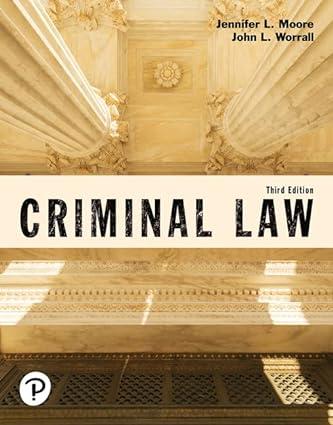A jury convicted Lawson of petty theft. He appealed and the California Court of Appeals affirmed. A
Question:
A jury convicted Lawson of petty theft. He appealed and the California Court of Appeals affirmed.
A jury found defendant, Brent Kerrigan Lawson, guilty of petty theft for stealing a \($20\) hoodie from a Walmart store . . . On this appeal, defendant claims his conviction for petty theft must be reversed because the trial court erroneously failed to instruct the jury, sua sponte, on the defense of mistake of fact. He argues that the jury could have reasonably inferred that he simply forgot about the hoodie, which was draped over his shoulder as he passed through the checkout line, paid for other items, and walked out of the store. And given that he forgot about the hoodie, he argues that the jury could have reasonably inferred that he did not intend to steal it when he walked out of the store with it.
We agree that the evidence supported a reasonable inference that defendant simply forgot about the hoodie and therefore did not intend to steal it. Nonetheless, the evidence that defendant forgot about the hoodie was insufficient to support an instruction on the defense of mistake of fact. The mistake-of-fact defense operates to negate the requisite criminal intent or mens rea element of the crime, but applies only in limited circumstances, specifically when the defendant holds a mistaken belief in a fact or set of circumstances which, if existent or true, would render the defendant’s otherwise criminal conduct lawful. Defendant’s act of forgetting about the hoodie did not amount to a mistaken belief in a set of circumstances which, if true, would have made his act of walking out of the store with it lawful.
We further conclude that, even if there had been sufficient evidence to support an instruction on the defense of mistake of fact, the trial court did not have a duty to instruct on the defense sua sponte, or on any other defense that served only to negate the intent element of the charged crime, including defendant’s true defense that he simply forgot about the hoodie. We therefore affirm the judgment.
. . . As we explain, the defense of mistake of fact is simply inapplicable to these facts. Defendant was charged with petty theft, specifically theft by larceny. “The elements of theft by larceny are well settled: the offense is committed by every person who (1) takes possession (2) of personal property (3) owned or possessed by another, (4) by means of trespass (5) with intent to steal the property, and (6) carries the property away. The act of taking personal property from the possession of another is always a trespass unless the owner consents to the taking freely and unconditionally or the taker has a legal right to take the property.” The fifth element of the crime states the specific intent or mental state element, while other elements identify the requisite criminal conduct.
The requirement that a criminal act be accompanied by criminal intent or criminal negligence is a “firmly embedded” principle of Anglo-American criminal jurisprudence. “As a general rule, no crime is committed unless there is a union of act and either wrongful intent or criminal negligence.” Subject to exceptions not applicable here, in order to commit a crime the defendant must possess the requisite intent or guilty mind at the time he performs the unlawful act. Section 26 lists classes of persons deemed incapable of committing crimes, and includes “persons who committed the act . . . charged” “under an ignorance or mistake of fact, which disproves any criminal intent”; “without being conscious thereof”; or “through misfortune or by accident, when it appears that there was no evil design, intention, or culpable negligence.”
Section 26 thus describes a range of circumstances or “defenses” which, the Legislature has recognized, operate to negate the mental state element of crimes and show there is no union of act and criminal intent or mental state.
Notwithstanding the myriad circumstances or “defenses” that may operate to negate the mental state element of a given crime, the particular “defense” of mistake of fact requires, at a minimum, an actual belief “in the existence of circumstances, which, if true, would make the act with which the person is charged an innocent act . . . .” For general intent crimes, the defendant’s mistaken belief must be both actual and reasonable, but if the mental state of the crime is a specific intent or knowledge, then the mistaken belief must only be actual. In all cases, however, the defendant’s mistaken belief must relate to a set of circumstances which, if existent or true, would make the act charged an innocent act.
. . . We observe that the mistake-of-fact defense would apply if defendant had been in the store earlier during the day, left his hoodie there, returned to get it, and, believing that someone had hung it up, took it off the hanger and walked out with it over his shoulder. The act of walking out of the store with the hoodie and without paying for it would be innocent because in this hypothetical defendant would have believed, although mistakenly, that the hoodie he had left in the store earlier, and the one he had on his shoulder when he walked out of the store, was rightfully his . . . The judgment is affirmed.
Questions:-
1. Explain when the defense of mistake of fact is available under California law.
2. Why is the defense not applicable to Lawson?
Step by Step Answer:






